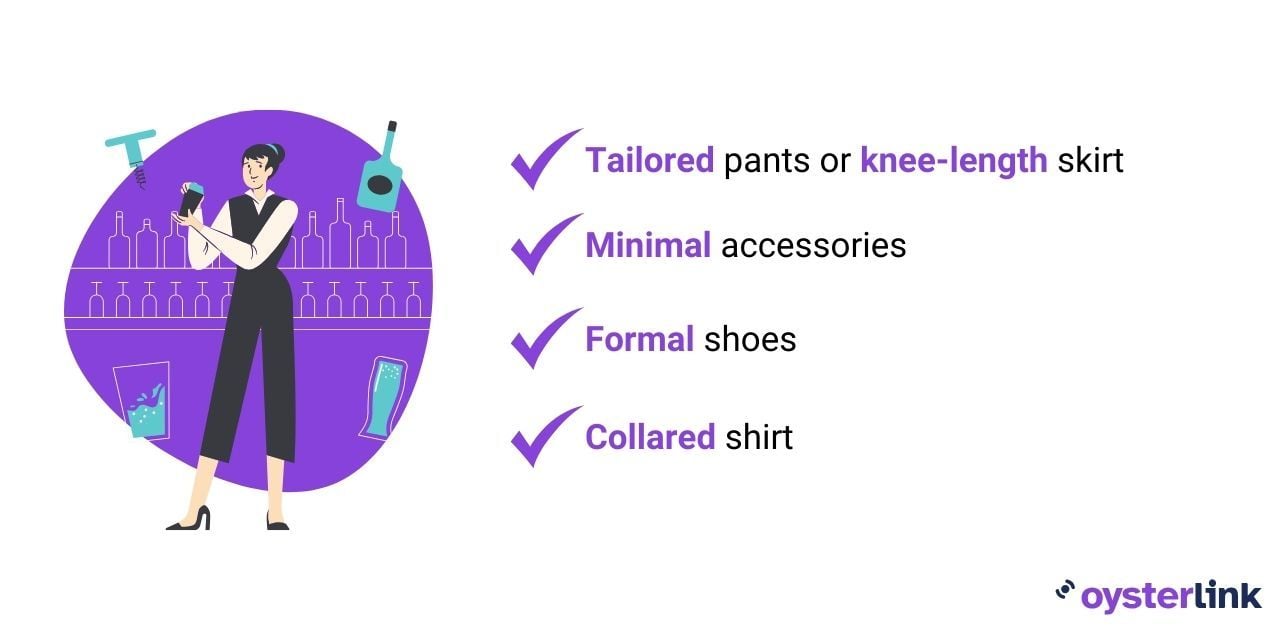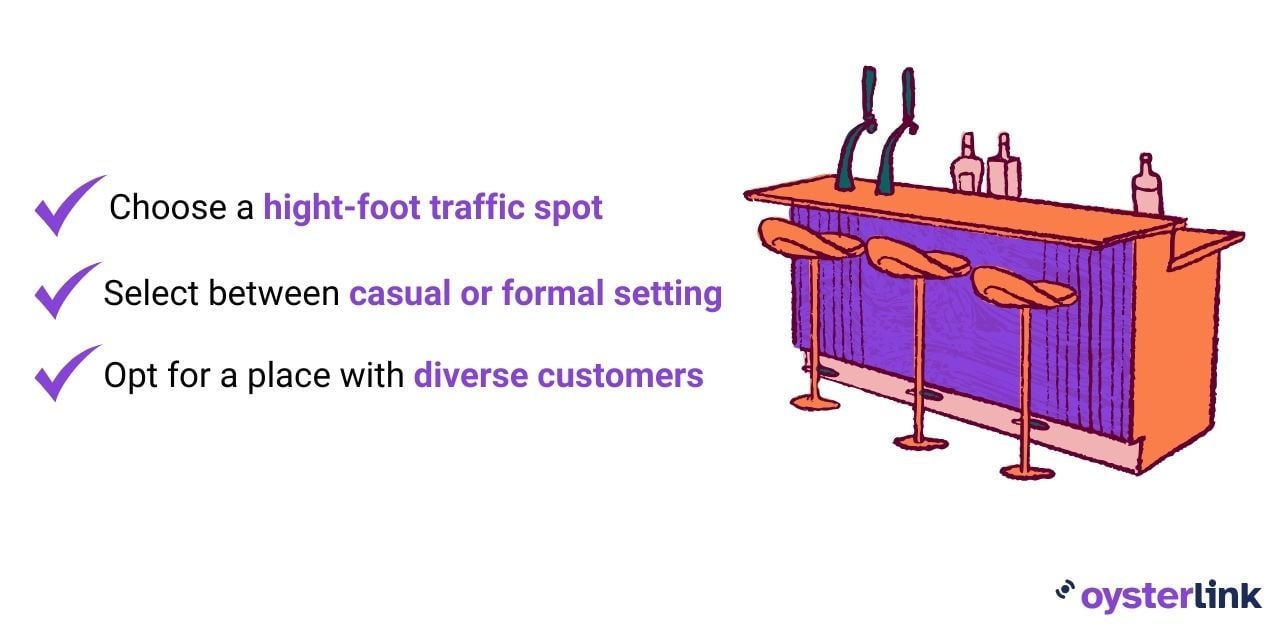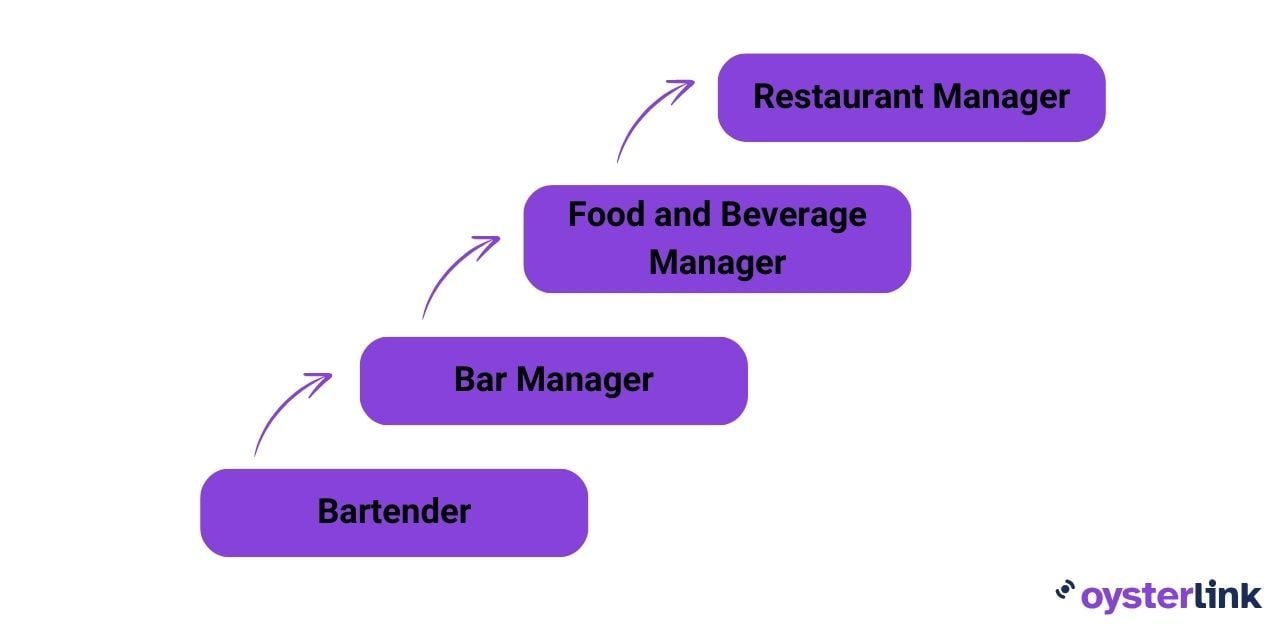How To Become a Bartender in 2026: Complete Guide
Becoming a Bartender offers the chance to meet many people and work on your interpersonal skills, as well as being creative and developing your drinks knowledge. In addition, the earning potential for this job is extremely high.
Bartenders in the U.S. earn $17.83 per hour, but with tips, they can double or even triple their average hourly rate.
How To Become a Bartender
The steps to becoming a Bartender are fairly easy if you follow our guide. And yes, you don’t need to spend a lot of money on certifications to know your way around the bar. Here is the simple breakdown before we delve into each point in more detail further below.
We’ll share how you can get started, develop important skills and help you throughout the job search process — from writing your resume and cover letter to preparing for interviews and finding establishments where you can apply.
1. Get TIPS Certified and Avoid Other Bartending Schools
The only certification you need to become a Bartender is from Training for Intervention ProcedureS or TIPS.
TIPS is a program created to promote safety in the workplace by teaching how to reduce the risk of intoxication-related incidents, prevent underage drinking and avoid drunk driving.
There’s no need to spend money on other bartending schools since you can watch free online tutorials on how to make drinks and learn the rest on the job.
In our article explaining how to get a bartending license, you can see which states require a TIPS certification to work behind the bar and serve alcohol and which don’t.
Do keep in mind, though, that a Bartending license is different from a bartending certification since the former is mandatory in a lot of states while the latter is just something you can use to promote to your potential employer.
2. Get a Job as a Barback
The best way to learn how to become a Bartender with no experience is to get a job as a Barback.
Barbacks maintain the bar area clean and organized. Their priority is to ensure the Bartender can efficiently make drinks for the customers. This includes tasks such as washing glasses, throwing out the trash and wiping the counters.
Similarities between Barback and Bartender roles
We’ve compared the job descriptions of Bartenders and Barbacks, and below are some key similarities between the two positions that you can learn by working as a Barback:
- Maintain a well-stocked bar inventory
- Interact with customers
- Use various equipment, including blenders, juicers and ice crushers
- Follow responsible alcohol practices
How you can learn as a Barback
Having similar duties and responsibilities as a Bartender provides a great opportunity to accelerate your path to becoming a Bartender. Here’s what you should focus on as a Barback:
- Observe how Bartenders engage with customers
- Ask questions about drink recipes
- Offer to help out in making drinks
- Study the menu so you can memorize the ingredients
3. Learn How To Make Drinks and Cocktails
For starters, Steve the Bartender, a famous Bartender turned entrepreneur, publishes videos on his YouTube channel teaching different mixed drink recipes.
Aside from making videos, Steve the Bartender also offers a free 3-day course teaching beginner Bartenders how to perfect their techniques in making drinks.
We also have a list of alcoholic and non-alcoholic cocktails you can add to your repertoire.
Learning how to make non-alcoholic drinks is important as some customers have no tolerance for alcohol or don’t like drinking but still want to enjoy a night out.
If you prefer a more straightforward compilation of drink recipes, we have 30 cocktail recipes you can always bookmark to use as a handy reference. This includes classic cocktail recipes, popular modern cocktails, tiki cocktail recipes and signature drinks from famous Bartenders.
4. Learn the Essentials of Bartending
Being a good Bartender isn’t just about knowing how to make drinks. It takes a combination of soft skills and qualities in order to create an unforgettable experience for customers.
Required skills
Here are some of the important skills and qualities required to become a successful Bartender.
- Organizational: Being able to maintain a clean and organized space, similar to a Chef’s mise en place, is the key to efficiency. Knowing where everything is located helps reduce clutter, save time and conserve energy.
- Communication: In order to provide excellent customer service, good communication skills are essential. It allows you to upsell, which can help increase profitability.
- Ability to stay updated on trends: The bartending industry is always shifting. Keeping up with the latest drinks ensures your customers are satisfied.
- Attention to detail: Presentation is as important as taste. A keen eye for detail ensures that drinks not only taste great but also look appealing and are garnished well.
- Problem-solving: Effective problem-solving allows you to de-escalate customer complaints and address equipment malfunctions without missing a beat, ensuring smooth operations.
5. Write an Incredible Bartender Cover Letter and Resume
Now that you know the only certification you need to obtain, a list of free educational materials you can use and the skills you need to develop, it’s time to put them all on paper to land your first Bartender job.
How to write your Bartender resume
Knowing the skills you need to highlight in your resume will help you stand out from other applicants.
Below, we’ve listed both hard and soft skills you need to include in your resume to make it attractive to employers and to help it pass the Applicant Tracking System (ATS), a software Recruiters use to filter candidates.
If you need more help formatting your resume, we also offer a resume template that is ideal for entry-level Bartenders.
How to write your Bartender cover letter
Some establishments, such as upscale or fine dining restaurants, may request that you submit a cover letter. Below, we provide tips on how to write a cover letter that will convince your potential employer to schedule an interview with you:
- Write an engaging introduction: Stand out by sharing an impressive accomplishment. As a beginner, you can say how quickly you learned and memorized 30 drink recipes and how you were able to serve them to friends during an occasion.
- Highlight what makes you perfect for the role: Aside from listing the skills recommended earlier, review the job ad posted by your potential employer and add the skills emphasized there to your cover letter.
- End the cover letter with a call to action: Provide your contact number or share your availability. Don’t forget to thank the employer for taking the time to read your letter.
6. Learn How To Dress as a Bartender

Once you’ve finally secured an interview, dress as if you’re ready to work.
The general rule for dressing as a Bartender is to make sure it’s comfortable and aligns with the workplace’s style.
Take note of the general colors and the vibe of the establishment. If it’s casual and uses black and white colors, then black pants and a white shirt should be appropriate.
For high-end establishments, tailored pants or knee-length skirts for bottoms and collared shirts are more suitable.
Accessories should also match the establishment’s style. It’s generally recommended to keep accessories to a minimum to avoid interfering with your work.
Finally, invest in a pair of good formal shoes, as they can be used in both formal and casual settings. Make sure they’re non-slip and fit perfectly, as you’ll be standing all day. Proper footwear also affects your posture, so choose wisely.
7. Find a Job in a Bar or a Restaurant

When looking for a job as a Bartender, decide if you prefer a more casual setting or a more structured atmosphere.
This choice is important for helping you shortlist the establishments you want to apply to. Working in an environment you enjoy also boosts your motivation.
Additionally, make sure that the establishment attracts a lot of foot traffic for potentially higher tips.
As a popular beach destination, you’ll have a lot of options applying to cocktail bars and restaurants in Miami.
New York City also provides Bartenders with unique job opportunities. With its thriving nightlife, NYC demands skilled Bartenders to attend to both local and international customers.
Working as a Bartender in Miami and New York City exposes you to a wide array of clientele, helping you hone your communication skills, build your network and connect with established Bartenders or bar owners.
Consider Whether You Really Want to Be a Bartender
A career as a Bartender may sound exciting with the perks that come with it, such as meeting a lot of new people, the potential to earn a high income and enjoying an exciting lifestyle.
But before diving in, make sure you’re prepared to overcome the challenges that come with the role.
Working as a Bartender is ideal if you’re a highly social person. This doesn’t mean that this job isn’t for introverts, but if engaging with others feels mentally taxing, you might need to reconsider. The role is already physically demanding. If you also need to work your brain as hard, pursuing this role isn’t sustainable.
Being a Bartender also means being okay with living with an unstructured schedule. You’ll likely be asked to work nights, weekends and holidays, which leads to a flexible schedule. You’ll need to make an effort to squeeze in spending time with your family and friends to achieve a healthy work-life balance.
Finally, tips can be both a boon and a bane. Since tips for every shift vary, it can lead to inconsistent income. This requires you to be financially responsible in order to manage your money during slower weeks.
Consider all these factors and whether they align with your preferences and future plans.
Advice From an Established Bartender
We asked a Bartender who's been working in this role for many years what advice he'd give to younger people or people looking to find a job in this position.
What piece of advice would you give to young people who want to advance in your field?
"One of the pieces of advice that I apply most (and also give to students or apprentices) is to never stop training and never stop learning. Continue learning about different topics that have to do with the bar, kitchen and hospitality industry as a whole.
Never forget your beginnings so that you'll always see the improvement you've made and how far you've come."
Next Steps After Becoming a Bartender

Bartenders can choose between two different paths.
They can either work their way up to senior roles or remain working as Bartenders and establish their own brand.
If you decide to eventually climb the ladder, you can work toward becoming a Restaurant Manager.
To do this, you’ll first need to be promoted to Bar Manager, where you’ll supervise a team, help with operations and handle administrative work.
Once you’ve gained enough experience, you can advance to a Food and Beverage Manager role, where you’ll also be responsible for implementing strategies to increase profits.
If you choose to remain a Bartender indefinitely, you can focus on creating signature cocktails, participating in bartending competitions or working as a private event Bartender to gain recognition.
You can also pay it forward and start your own social media channels to help other aspiring Bartenders.
